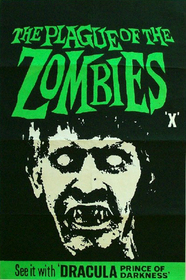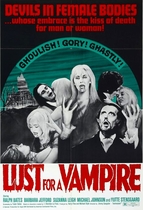Our editor-in-chief Nate Yapp is proud to have contributed to the new book Hidden Horror: A Celebration of 101 Underrated and Overlooked Fright Flicks, edited by Aaron Christensen. Another contributors include Anthony Timpone, B.J. Colangelo, Dave Alexander, Classic-Horror.com's own Robert C. Ring and John W. Bowen. Pick up a copy today from Amazon.com!
The Plague of the Zombies (1966)
Filmed back to back with The Reptile, another Hammer film, The Plague of the Zombies features not only members of the same cast and crew, but also some of the same sets and a similar premise. It's another fine example of misconceived conventional wisdom notions of what leads to quality, as the duplication would usually suggest low-budget, problem-infested films, but instead, Plague, at least, is a minor masterpiece by one of the finest horror studios to date.
After a delightful "Hammer campy" (which means campy and a bit exaggeratedly bizarre, but not cheesy or unintentionally funny) opening shot featuring wailing voodoo drummers and a masked ritual master, Plague segues to Sir James Forbes (André Morell), a professor of medicine at London University, who receives a letter from a former student, Dr. Peter Thompson (Brook Williams). Dr. Thompson is the town physician of a small Cornish village that has experienced a recent rash of unexplained deaths. He wrote to get his former professor's opinion on what might be the problem, but as Forbes has a daughter, Sylvia (Diane Clare), who knew Thompson's now-wife, Alice (Jacqueline Pearce), Sylvia talks James into making a minor holiday of it and heading to Cornwall. When they arrive, they experience much stranger things than they had ever imagined. Plague concerns their discoveries and investigations as well as their immersion into an increasingly nightmarish world.
It's a good story, and that fact is one of the primary ones that make Plague such a success. Scriptwriter Peter Bryan's work is intriguing, with clever dialogue and just the right blend of horror mythology and realism.
But even better than the great script are the incredible performances. This is a cast that could probably read the phone book in an enchanting manner. They also achieve a perfect blend of realism and willingness to be caught up in a zombie story, even Sir James, who initially comes across as a staunch, if somewhat wry, skeptic. In fact, a sly, intelligent humor pervades much of Plague, and seems equally attributable to the cast and script.
But it's not jokey humor, and it doesn't come across as a release in tension. That infamous Hammer atmosphere is as present here as in any of their other films--director John Gilling does an excellent job relaying it. Plague conveys a very creepy reality where deep secrets are sheltered by citizens who fear revealing them as much as they fear the consequences of not doing so.
One of the more subtle elements in Plague is the production/set design. The Cornish town is appropriately quaint, somewhat claustrophobic and yet gothic, as are all the details from the Thompson home and its wonderful wallpaper to the small town architecture. The Squire's home and the tin mill, both the parts that are above and below ground, are wonderfully forbidding. Best of all is the town cemetery, which serves as one of the most crucial sets of the film. Much of the "hinge" action takes place in the cemetery, which though very small, is grandly gothic, creepy, and just oozes atmosphere.
Of course in a film with a title like The Plague of the Zombies, the titular creatures are important, and the ghouls here are wonderful in every respect. They may not be the goriest -- Fulci would have likely rejected them, but for my money, they're much more effective in terms of eerieness than anything in Fulci's Zombi 2. They look either newly dead--just like the live people we may encountered in a previous scene but now empty and pale, or in a further state of decay, whichever is appropriate to how long they've been zombies. They seem neither like simple automatons nor vacant shells just out for cannibalistic delights. In line with the traditional Haitian accounts of "real" zombification (As of 1966, The Plague of the Zombies may have been the film most based on the real-life source of zombie films since White Zombie in 1932), there seems to be a soul, or consciousness, trapped in a hypnotized body. These zombies are both threatening and tragic, as we can relate to their history as humans like us.
Like many Hammer movies, The Plague of the Zombies works as a bridge between the classical 20th century horror films and the later ones. Stylistically they can fit in with the best Universal creations of the 30s, but they extend the genre in various ways that, in light of horror from the late 70s and beyond, demonstrates just how justifiably influential Hammer was on other filmmakers. Plague of the Zombies best shows this in the staging of the mass zombie attacks in Dr. Thompson's dream, which strongly foreshadows the George Romero approach.
Hammer was also largely responsible for making inroads to increased gore. Again, while a rabid Fulci fanatic might find Plague intolerably tame, for my money, the use of gore here is just as effective as anything using buckets of blood. There's not much in terms of quantity of blood, but what's there, as always in Hammer films, is dealt with excellently--the small amount, in combination with the fine story, directing and acting, accentuates it that much more-images such as a finger being bled into the vial, the pool of blood in the cemetery dream, or the infamous decapitation are all top-notch and couldn't be more effective.
As a bridge in the genre, Hammer films are among the most important historically. They're also frequently some of the highest quality films considered in isolation, and Plague is no exception. Don't miss this one.









First saw this in 1966 on a
First saw this in 1966 on a double-bill with DRACULA, PRINCE OF DARKNESS - both remain among my favorite "comfort films" to re-watch and enjoy all over again at intervals of about 5 years or so. Watching this one again in June, 2011 and thoroughly enjoying it - excellent performances and camera-work make this one a leader of the pack
I have over 50 zombie films
I have over 50 zombie films in my collection and this is one of my favorites.<br>
Every aspect of this film is much better than one would expect from the 1960s. Or even the 1980s.<br>
I was especially impressed with the make-up.The zombies looked great.<br>
There are countless, more recent "B" movies that should have studied this one, before creating all those lame dead-heads.<br>
If you want to venture into the addictive world of the dead, The Plaque of the Zombies is a great place to start.
load of shit
load of shit